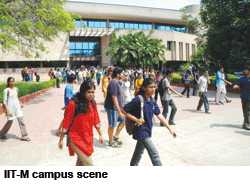An enduring and indelible characteristic of academics and administrators in India’s 31,000 colleges and 603 universities is a patriarchal mindset and prim sexual conservatism — often described as envy — which inhibits them from respecting even postgraduate students as adults. In college and varsity campuses countrywide, it’s quite common for learned professors and academics to refer to adult students as “boys and girls” requiring lifestyle advice and moral guidance. This patriarchal mindset which prompts college and university managements to issue sartorial guidelines and discourage male-female interaction, has prompted even the globally renowned Indian Institute of Technology-Madras (IIT-M) to prescribe a list of rules and moral code of conduct for students ostensibly to ensure their safety on its 617-acre campus. According to an IIT-M spokesperson, with student strength having grown to 7,000, of whom 1,000 are women students, and several instances of theft, sexual harassment and assaults on women in unsafe areas on campus, the management has been compelled to introduce stricter lifestyle rules.
 The revised set of rules issued by the IIT-M management bars women students from venturing out of their hostels after 11 p.m without a male escort, restricts the use of internet in hostels and imposes constraints on annual hostel night celebrations when juniors felicitate graduating seniors. Moreover, the administration plans to install a biometric identification system in hostels which would keep track of students’ movements in and out of hostels; conduct self defence programmes for women students and install 2,000 CCTV cameras on campus. The management has also asked students and parents to sign a “safety declaration” in which students acknowledge the risks of wandering outside the safe zones at night, and absolve the institute from responsibility if rules are disobeyed.
The revised set of rules issued by the IIT-M management bars women students from venturing out of their hostels after 11 p.m without a male escort, restricts the use of internet in hostels and imposes constraints on annual hostel night celebrations when juniors felicitate graduating seniors. Moreover, the administration plans to install a biometric identification system in hostels which would keep track of students’ movements in and out of hostels; conduct self defence programmes for women students and install 2,000 CCTV cameras on campus. The management has also asked students and parents to sign a “safety declaration” in which students acknowledge the risks of wandering outside the safe zones at night, and absolve the institute from responsibility if rules are disobeyed.Unsurprisingly the new code of conduct governing the private lives and lifestyles of IIT-M students including 3,005 postgraduate and 2,185 Ph D students, has generated a furore on campus, with students accusing the administration of “moral policing”. Women students are opposed to the night curfew and students of both sexes have especially protested the rule governing hostel night celebrations which permits them to invite only two outgoing seniors to their rooms, keep their doors open and end all celebrations by 10.30 pm. “The rules target women students in particular and are sexist, gender oppressive and restrict women’s freedom on campus. If the administration wants to ensure safety of women students they should improve security and start patrolling unsafe campus zones,” says a final year student of IIT-M.
With the national media supporting students, especially after media exposure of leaked e-mail exchanges between hostel wardens — which cast aspersions on students’ characters and revealed their disdain for students’ privacy — the IIT-M administration has clarified at an open campus forum that the opinions of the wardens are not of the management and that the proposed rules will not be enforced without students’ consent. “Our concern for students’ safety is being misconstrued as moral policing and violation of students’ rights. Moreover students should bear in mind that the management is answerable to parents for any mishaps,” says L.S. Ganesh, dean of students at IIT-M.
Justifying moral policing by arguing that administrators are responsible to parents for students’ safety is also a standard argument in Tamil Nadu’s 520 engineering colleges affiliated with Anna University where dress, lifestyle and socialisation restrictions are harsher, gender discrimination is the rule and there is blatant disregard for students’ freedoms. Dress codes are prescribed for women students and there are separate stairways and seating arrangements for men and women students. Socialisation and interaction between the sexes is frowned upon and there is regular patrolling in colleges to ensure that students conform.
Liberal academics and sociologists ascribe the harsh restrictions imposed upon adult collegiate and university students to the fear among administrators of “losing their exclusive identity as Indians”. “New gender equations are emerging due to liberalisation and globalisation and Indian society is not yet ready for major shifts in values. That is why college administrators of the older generation show intolerance to radical ideas and behaviour. Forcing unreasonable rules and restrictions on students is not advisable as they will find ways to break them. Instead they should be allowed to take responsibility for their actions and face the consequences. That is also education,” says Dr. D. Jayalakshmi, former professor of sociology at Madras University and currently registrar of the Chennai-based Rajiv Gandhi National Institute of Youth Development.
Quite clearly, IIT-M has to take the lead in changing fossilised attitudes and mindsets within college administrations. After all, it has a reputation for encouraging free thought and expression among students.
Hemalatha Raghupathi (Chennai)


























